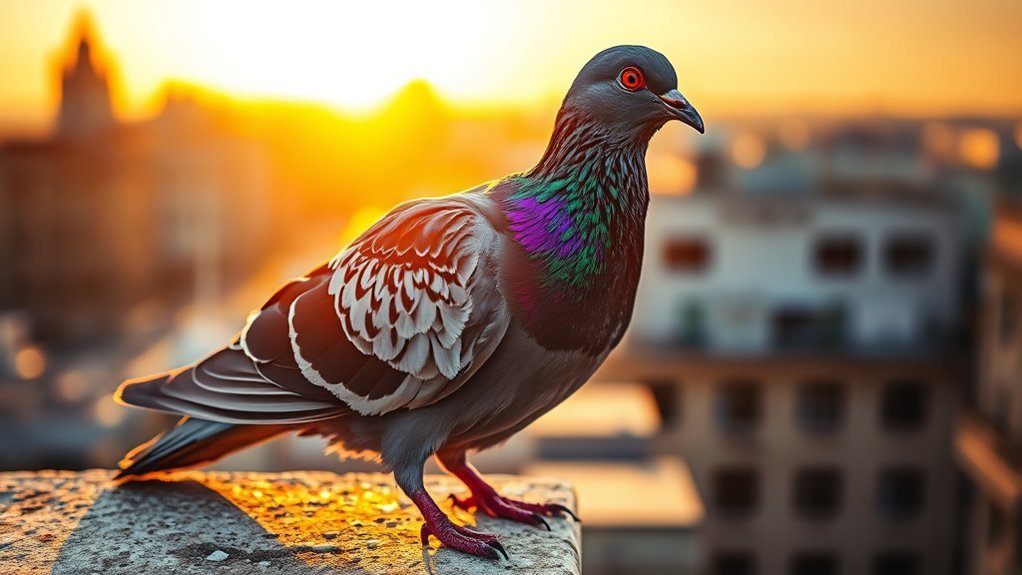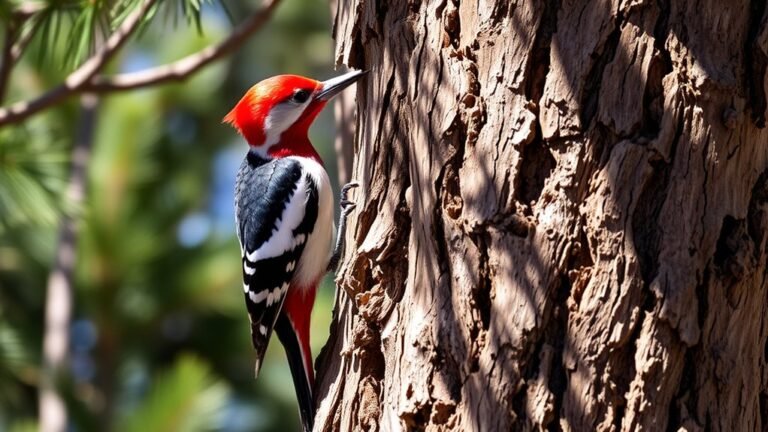How Long Do Pigeons Live? Facts and Insights
Pigeons usually live between 5 to 15 years in the wild. Many things can affect how long they live. Their home environment, access to food, and how they interact with other birds all play a part in their lifespan.
Interestingly, pigeons in cities might live longer because they can find food more easily. However, both wild and pet pigeons face challenges that can impact their health and survival. Let's explore what affects their lifespan and how everything connects.
A Quick Overview
Pigeons can live for about 5 to 15 years in the wild. Their life depends on where they live and the dangers around them. Domesticated pigeons often live longer because people take care of them and feed them well.
A pigeon's lifespan can also be affected by things like their genes, what they eat, and how they interact with other pigeons. In cities, pigeons usually find plenty of food, which can help them live longer, too.
However, pigeons face dangers from predators like hawks and cats, which can shorten their lives. Overall, many factors play a role in how long pigeons live.
Understanding Pigeon Lifespan

Pigeons can live between 5 and 15 years in the wild. Their lifespan can change based on different things like where they live, how much food is available, and threats from predators.
Pigeons that make friends and stick together often live longer. They help each other find food and stay safe.
In cities, pigeons do well. They find food easily, which can help them live longer lives.
All these factors connect to make each pigeon's life journey unique. Understanding how these birds live can help us appreciate them even more.
Wild vs. Domesticated Pigeons

Wild and domesticated pigeons are both part of the same species, but they live and act very differently.
Wild pigeons find their own food and stay safe from danger. This is how they survive in nature. On the other hand, domesticated pigeons have changed to depend more on people. They can be close to humans and enjoy different kinds of food. These changes help them get along well with us.
You can see wild pigeons in parks and city streets. They're used to being outdoors.
Domesticated pigeons usually live in homes or on farms. People keep them for companionship and as pets.
Factors Influencing Lifespan

Many things can affect how long a pigeon lives. These include its genes, the place it lives, and what it eats.
First, let's talk about genes. When people breed pigeons, they often choose birds that are healthy. This helps create baby pigeons that are also strong, which can lead to a longer life.
Next, the environment matters. If pigeons live in a safe and clean place, they tend to be healthier. A messy or dangerous area can make them sick and shorten their lives.
Diet is important too. Pigeons need a good mix of food that has the right vitamins and minerals. This helps keep their immune system strong, which means they're less likely to get sick.
Social life is key as well. Pigeons that are with other friendly pigeons often do better. Being around others can help reduce stress and make them happier.
If you pay attention to these factors, you can help your pigeon live a longer and healthier life.
Common Predators and Threats
Pigeons live in cities and on farms, but they've many dangers that can threaten their lives. Knowing about these dangers can help us protect them:
- Hawks: These birds are fast and can spot pigeons very well. They hunt pigeons in the sky.
- Cats: House cats like to chase birds. They can be a big threat, especially in cities where many cats roam free.
- Raccoons: These animals like to look for food. They might attack pigeon nests or take baby pigeons.
- Falcons: Quick and nimble, falcons can catch pigeons in mid-air.
- Humans: Pollution and taking away places where pigeons live can harm them. Some people also hunt pigeons.
Environmental Impact on Longevity
When you watch pigeons in your area, think about how their surroundings affect how long they live.
City life has good and bad sides for these birds. Pigeons can find a lot of food in cities, which is good for them. But they also deal with pollution and less safe homes.
Climate change brings strange weather, too. Really hot or cold days can make it tougher for pigeons, which might shorten their life.
If we take care of parks and buildings, we can make the city better for pigeons.
Knowing how these things work can help you connect with the birds around you.
Diet and Nutrition Considerations
Pigeons need good food to stay healthy and happy. A balanced diet helps them live longer and feel strong.
Here are some easy tips for feeding pigeons:
- Seed Mix: Give them a mix of seeds like millet, corn, and peas. This mix provides different nutrients to keep them healthy.
- Whole Grains: Add whole grains to their diet. Grains give them energy and fiber.
- Fresh Fruits and Veggies: Offer leafy greens and seasonal fruits. These foods give them vitamins they need.
- Calcium Supplements: Use calcium, especially when they're breeding. This helps their bones and eggs stay strong.
- Clean Water: Always have fresh, clean water available. Dirty water can make them sick.
Taking care of their diet helps pigeons live a happy and healthy life!
Health Issues in Pigeons
Pigeons can get sick, just like other pets. They might face health problems such as coughs, feather loss, or tummy aches. These issues often happen because they don't eat well, feel stressed, or live in bad conditions.
It's important to watch your pigeon closely. If you see signs like tiredness or not eating, it could mean something is wrong. Getting help from a vet quickly is very important. A good vet can help keep your pigeon healthy and provide the right treatment if needed.
Regular check-ups are also a good idea. They help catch problems before they get worse.
Record-Breaking Lifespans
Many pigeons can live a long time, with some living up to 15 years or more if they've the right care. This long life is often because of their genes and how well they're taken care of.
Certain breeds, like racing homers, are known to live longer than others. Here are some important factors that help pigeons live longer lives:
- Good nutrition and feeding habits
- Regular check-ups with a vet
- Safe living spaces away from predators and bad weather
- Friendly interactions with other pigeons
- Strong breeding programs focused on long life
Caring for pigeons in these ways can make a big difference in how long they live.
Conservation Efforts and Their Importance
Pigeons might seem like just ordinary birds in the city, but they're important for our environment. Taking care of pigeons helps keep our urban areas healthy and vibrant.
Simple actions, like making parks or building bird-friendly homes, can help pigeons live better in our cities.
When we support pigeons, we also help other animals and plants. A city with happy pigeons is a city with a balanced ecosystem. This balance makes the environment better for everyone, including us.
You can get involved by joining local groups that help protect pigeons. Supporting these efforts is a great way to feel connected to your community.
Every bird has a role, and by caring for pigeons, you can help make your neighborhood a nicer place. Let's work together to make sure pigeons stay a part of our cities!
Frequently Asked Questions
Do Pigeons Have Any Natural Enemies Besides Humans?
Pigeons have several enemies in nature besides humans. Their main predators are birds like hawks and falcons. These birds hunt pigeons for food.
Pigeons also face other problems. For example, they deal with habitat loss. This means they lose places to live and nest. Pollution is another issue. Dirty environments can harm their health and food supply.
Despite these challenges, pigeons are strong and adaptable. They often find ways to survive in cities and other areas where they live.
Can Pigeons Be Kept as Indoor Pets Successfully?
Yes, you can keep pigeons as indoor pets! With the right care, they can be happy and healthy at home. Here are some tips to help your pigeons thrive:
- Safe Space: Make sure your home is safe for pigeons. Remove anything that could hurt them. Provide a cozy area where they can relax.
- Social Time: Pigeons are friendly animals. Spend time with them every day. Talk to them and let them come out to play. This helps them feel loved and connected to you.
- Room to Move: Pigeons need space to fly around and exercise. Make sure they have enough room to stretch their wings a bit, even inside your home.
What Are the Breeding Habits of Pigeons?
When you watch pigeons, you can see their special courtship dances. They often choose one partner for life. Pigeons build warm nests together where they take care of their babies. This helps keep their family strong and growing. It's heartwarming to see how they work together!
How Do Pigeons Recognize Their Owners?
Pigeons can recognize their owners quite well. They often remember you by your voice and your presence. When you spend time with them, they form strong bonds. These bonds help them feel safe and trust you.
When you talk to your pigeon or spend time together, they learn your sounds and movements. This makes them feel closer to you. Over time, they respond to you with affection and loyalty. Pigeons enjoy these connections and show it by being friendly and excited when they see you.
Are There Notable Pigeon Breeds With Different Lifespans?
Yes, different pigeon breeds can live for different lengths of time. Most city pigeons usually live about 3 to 5 years. However, some special breeds, like homing pigeons, can live for up to 15 years. This shows that there's a variety in how long pigeons can live, which might be interesting for you!

Luna is the passionate founder and author of Birds and You, a website dedicated to sharing her love for birds with fellow enthusiasts. Through her engaging articles and guides, she aims to educate and inspire others to explore the fascinating world of birds. When she’s not writing, you can find Luna observing birds in their natural habitats or sharing beautiful bird photography on Pinterest. Join her on this journey to celebrate and protect our feathered friends!







